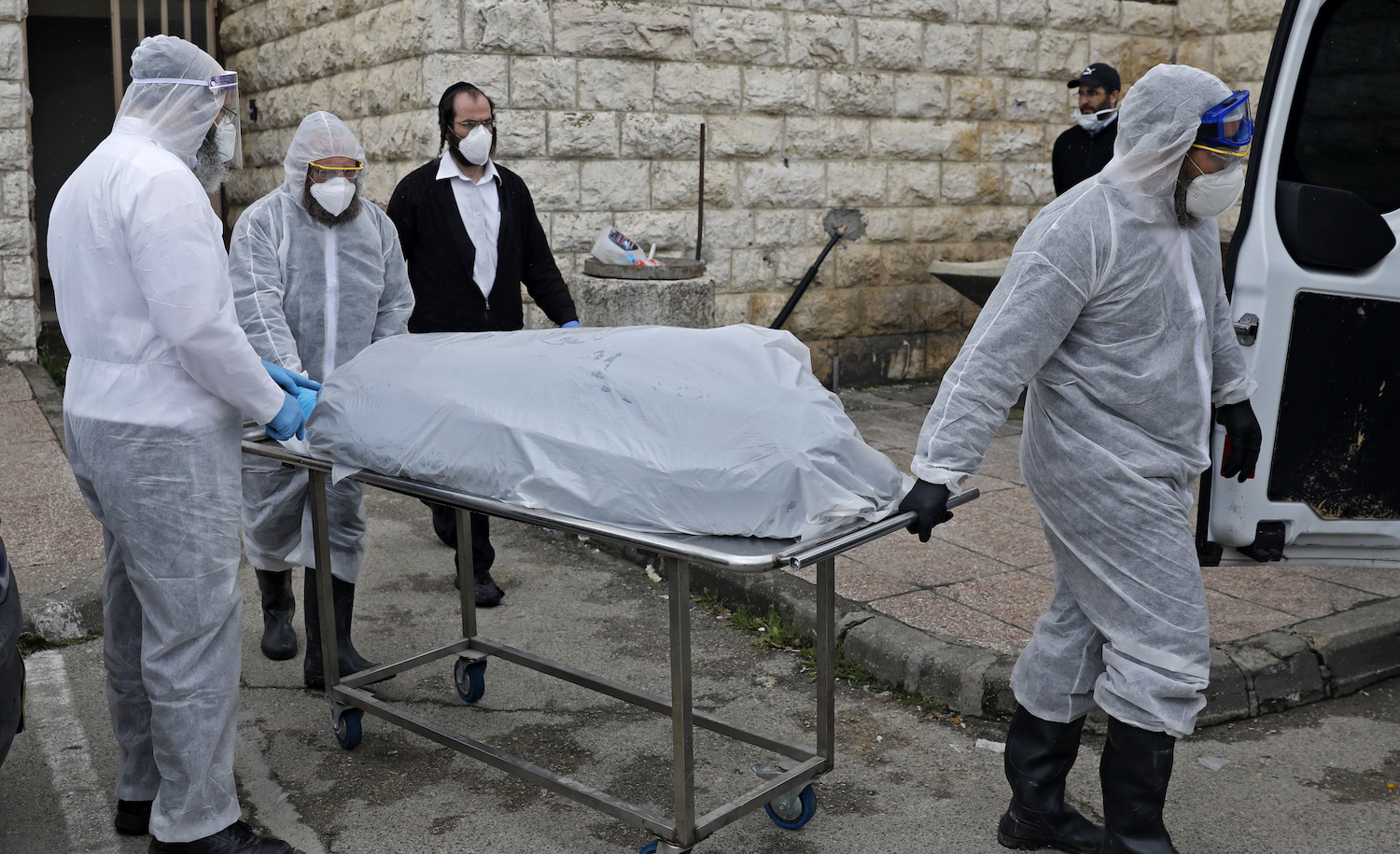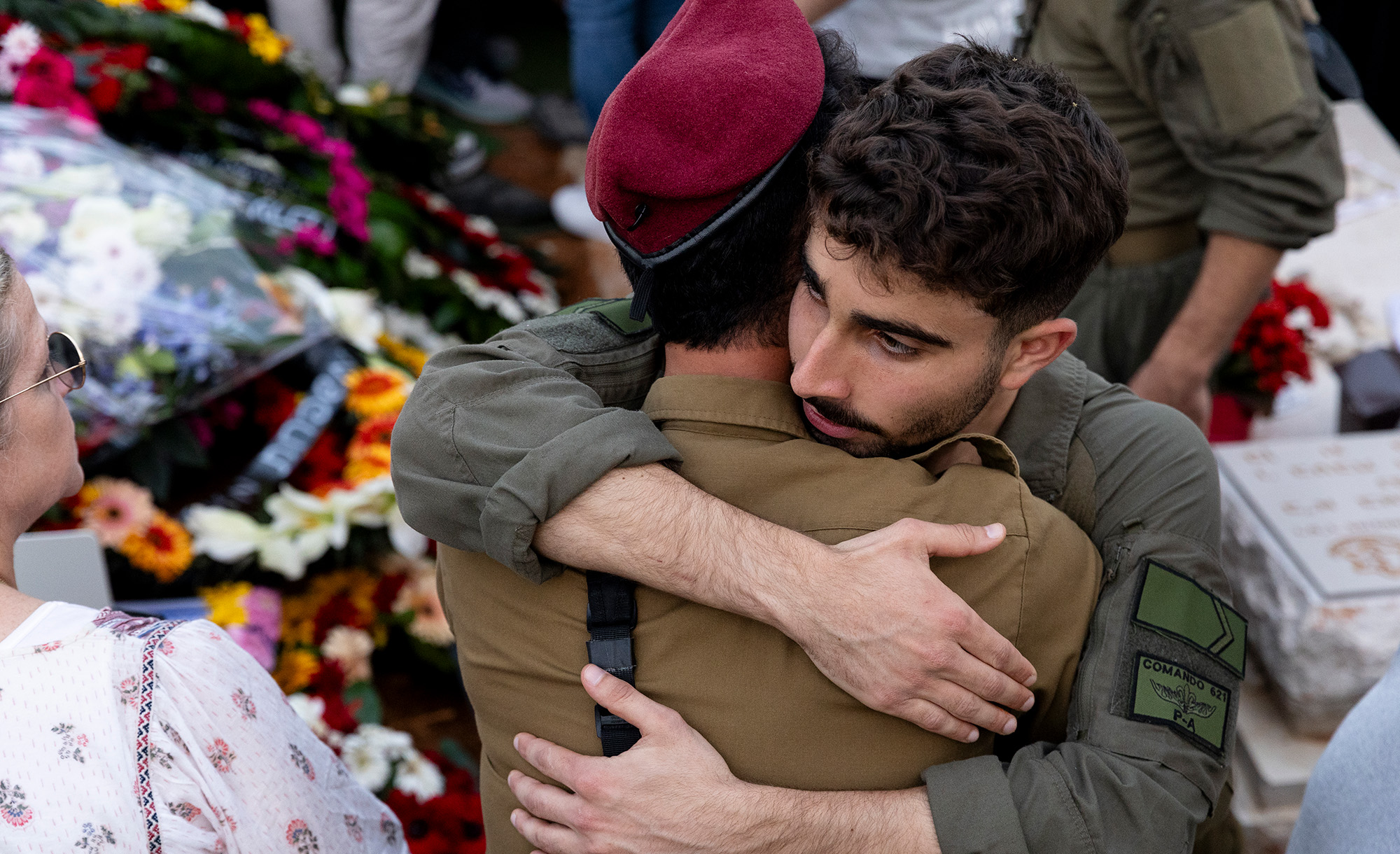Two weeks ago, a woman came to my home in Israel wearing a hazmat suit and swabbed my family of seven for COVID-19. Thank God, we tested negative. In Chicago, at the very same moment, several other strangers—doctors, nurses, orderlies—were treating a beloved family member fighting the coronavirus. (He has thankfully since recovered). While not wearing full-body protective gear, those caretakers at least had the benefit of masks and gloves—worn not for the benefit of my relative, but to protect themselves from infection.
Not all those treating the disease are so lucky. Across the United States there are serious shortages of protective gear at hospitals, and medical professionals have been falling seriously ill from exposure. The rate of infection for doctors and nurses is increasingly worrisome in Spain and Italy, where some fear it could lead to the collapse of the national healthcare systems. And let us also not forget doctors in China like Li Wenliang, who succumbed to the illness after trying to warn the world of its dangers. Indeed, the rate at which medical professionals exposed to COVID-19 contract the virus themselves poses a grave moral question: given the risks to their own safety, would they be justified in refusing to treat patients, especially if they would have to do without proper protection?
This question is not novel, but the current pandemic raises the stakes considerably. The American Medical Association’s 1847 inaugural code of ethics demanded, “When pestilence prevails, it is [physicians’] duty to face the danger and to continue their labors for the alleviation of the suffering, even at the jeopardy of their own lives.” More recent codes have backed away from such explicit requirements and substituted them with more generic charges to “serve to the best of their ability.” These questions confronted medical ethicists during the early days of the AIDS epidemic in the 1980s, and during the outbreaks of SARS and Ebola in the early 2000s and 2010s. As is true with COVID-19, these diseases were not initially well understood, and scientific knowledge about how they are transmitted was still developing. To make matters worse, the evidence about the coronavirus suggests that it spreads quite easily. Firefighters, law enforcement officials, and soldiers take on their jobs knowing that they might be called upon to risk, or even sacrifice, their lives; not so physicians, nurses, and orderlies. Yet now their work requires them to do so.
Faced with such fraught and pressing questions, it is worth turning to the Jewish tradition, with its long and rich history of dealing with this sort of specific ethical conundrum. The starting point of any such discussion is the famous talmudic dictum that “Whoever saves a single life is considered as if he saved an entire world.” More concretely, the Talmud derives from two biblical prooftexts an obligation to save the life of another. The first is the injunction, in Deuteronomy 22:2, to restore lost property. Under that somewhat counterintuitive guidance, our health can be considered our most important asset, and when a person loses it, others are required to repair it. The second and more obviously applicable source is the statement “You shall not stand idly by the blood of your fellow” (Leviticus 19:16), which, in the Talmud’s reading, calls upon a person to commit his financial resources if they are necessary to save someone’s life.
Yet it is by no means clear that one must risk his own life to fulfill these requirements. After all, one is positively forbidden from endangering his life to observe the Sabbath, keep kosher, or attend synagogue. With scarce exceptions, rabbinic law requires us “to live by the commandments, not die by them.” Based on the same principle, Orthodox doctors, ambulance drivers, and soldiers routinely violate the Sabbath to protect the lives of others.
That these legal principles, which place such high value on the sanctity of human life, can be in tension with one another is acknowledged in the Talmud in a debate between two scholars of the 3rd century CE. After another sage was captured and in mortal danger, Rabbi Yoḥanan, deeming the risk of a rescue attempt too great, declared, “Prepare the burial shrouds”—that is, accept that the captive’s life will be lost. By contrast, Yoḥanan’s disciple and intellectual sparring partner, Reish Lakish, boldly asserted, “I will either kill or be killed. I will go with force and save him.” Reish Lakish’s daring mission to save the captive sage succeeded, but his personal courage did not become the norm; the majority of post-talmudic scholars deemed Yoḥanan’s contrary position binding.
But the applicability of Yoḥanan’s opinion—don’t risk your life to save another’s—to the present question—what can medical professionals acceptably risk—is not as clear-cut as it might at first seem. Part of Yoḥanan’s calculation was that a would-be rescuer like Reish Lakish would be risking his life with a low probability of successfully saving captive in question. By the same token, someone with poor swimming skills shouldn’t jump into rapidly flowing waters to save a drowning man, but perhaps a well-trained lifeguard should. Or, to take another example, most halakhic authorities deem live kidney donation—now a low-risk procedure—as both permissible and meritorious. (Just how far bodily sacrifice goes is a matter of debate; as one important medieval ruling put it, one doesn’t have to allow one’s arms to be amputated in order to save the life of another.)
In short, a balance must be struck between the risk and the potential outcome, and for guidance on how to find that balance in our current situation we must look at how the rabbis of the past dealt with the specific issue of contagion. Even many centuries before the modern discovery of bacteria and viruses, it was understood that fleeing from a town stricken by plague could be a life-saving measure. Thus the great 16th-century Polish halakhist Solomon Luria cited as authoritative the talmudic opinion that one should flee an epidemic. Yet he added an important caveat: “If it is within a person’s capability to save others either physically or with money, God forbid that he should refrain from doing so and remove himself from the plight of the people.” In other words, obligations to attend to the sick are not distributed evenly across society. Those with greater ability to help must bear greater risk.
The most extensive discussion of these duties came in the wake of the successive cholera epidemics that swept through Europe in the 19th and early 20th centuries. In 1829, one German scholar, Israel Lifschitz, prohibited hiring people to care for cholera patients, believing the risk too great. Following this precedent, Rabbi Zeev Wolf Leiter of Amsterdam ruled immediately after the outbreak of World War I that there was no requirement to endanger oneself to treat the highly contagious. Yet such decisions were the exceptions, not the rule. During that same 1829 pandemic, Akiva Eiger, the outstanding German talmudist of his day, supported the hiring of caretakers and the active intervention of doctors, while readily acknowledging that they could not protect themselves from infection.
Later in the century, Rabbis Chaim Soloveitchik of Brisk and Eliyahu Chaim Meisels of Lodz personally helped carry cholera patients to get medical care. When pressed to justify such self-endangerment, Soloveitchik asserted that it was necessary to follow the example of Reish Lakish and endanger oneself to save those who are originally at risk. Soloveitchik and Meisels ended up surviving, but many others who cared for the sick contracted the illness and died.
Likewise during the 1865–66 cholera outbreak in Jerusalem, the foremost Sephardi rabbinic leader, Chaim Chazan, moved into the confines of the city’s ancient walls to distribute alms and food, while a young and determined doctor, Benjamin Rothziegel, led heroic efforts to prevent the spread of the disease while tending to its victims. Some survived, but among the dead were Rothziegel’s wife and three-month old son. Two months later, when the epidemic had already begun to wane, Rothziegel himself succumbed and was buried alongside them in the cholera section of the Mount of Olives cemetery.
Drawing in part on this legacy of self-sacrifice, the halakhic authorities of the past 70 years have generally inclined toward the position that physicians must treat the sick in a time of a pandemic, especially given our more sophisticated understanding of contagion and the consequently more effective tools we have to prevent its spread. Ultimately these authorities have resorted to arguments based not on the duties of the individual but on the needs of society: those with the greatest expertise and training must do their part to save those who are suffering and curb the spread of contagion (to “flatten the curve,” as we now say). Even as it is hard to construe a binding legal obligation (ḥiyuv) to treat, it is appropriate to demand that people perform this great deed (mitzvah rabbah) as part of their civic responsibility. The scholar who wrote most extensively about this topic, the brilliant Jerusalemite rabbi Eliezer Waldenburg (1915–2006), compared epidemics to battlefields in which soldiers and medics endanger themselves to protect society as a whole.
The current shortage of personal protective equipment, however, raises specific concerns; after all, officers aren’t supposed to unnecessarily expose their soldiers to enemy fire, and healthcare professionals, who are bound by different structures and traditions than the army, may more readily go AWOL when they believe their civic leaders have failed them by not preparing stockpiles of equipment. They’ll save themselves, and their services, for another day. It’s hard to condemn the individual doctor or nurse—who likely has competing obligations as a parent, child, husband, or wife—for refusing to walk into a ward filled with the sick and contagious without even the protection provided by a surgical mask. But then if every doctor and nurse were to retreat from duty, the miraculous advances of modern medicine would be for naught, and we would be as vulnerable to the coronavirus as our ancestors two centuries ago were to cholera.
While the performance of the general populace at adhering to social-distancing guidelines has so far been mixed, healthcare professionals, to their enormous credit, have continued to show up for their shifts. In this pandemic, they must shoulder an unequal burden, strengthened by heroic virtues, including honor and self-sacrifice. Despite the legitimate worries of social scientists that organizing a society around individual rights would weaken civic responsibility, at this hour of crisis heroic virtues are manifest in nearly every ward of every hospital in precisely the nations where they were sometimes thought to be in short supply. One hopes that the self-sacrifice displayed now by healthcare professionals will lead to a renewed sense of mutual responsibility throughout society.
The vision of society and individual obligation that informed the rulings of Luria and Waldenburg is one in which each individual must acknowledge his role as bringing with it certain demands. This brings us back to Reish Lakish, who didn’t issue a general directive along the lines that “People must risk their lives to free captives who are in danger of death.” Rather, he led by example to assert that “I, Reish Lakish, will put my safety in question when the lives of others are undoubtedly in danger.” This standard might not be the norm but it becomes necessary in extraordinary circumstances.
It’s worth noting that, before becoming a sage, Reish Lakish was a bandit. His former occupation had given him the abilities necessary to undertake a risky rescue mission, and his later occupation gave him a duty to do so. In the cholera-related cases I cited above, it wasn’t just doctors who risked their lives, but rabbis. Their noble actions no doubt served as an inspiration to others, and perhaps also a reminder that our social order depends on virtuous citizens who willfully accept the call of duty, and that our obligations to one another are stirred by our obligations to God.
More about: Coronavirus, Halakhah, Jewish law, Politics & Current Affairs







